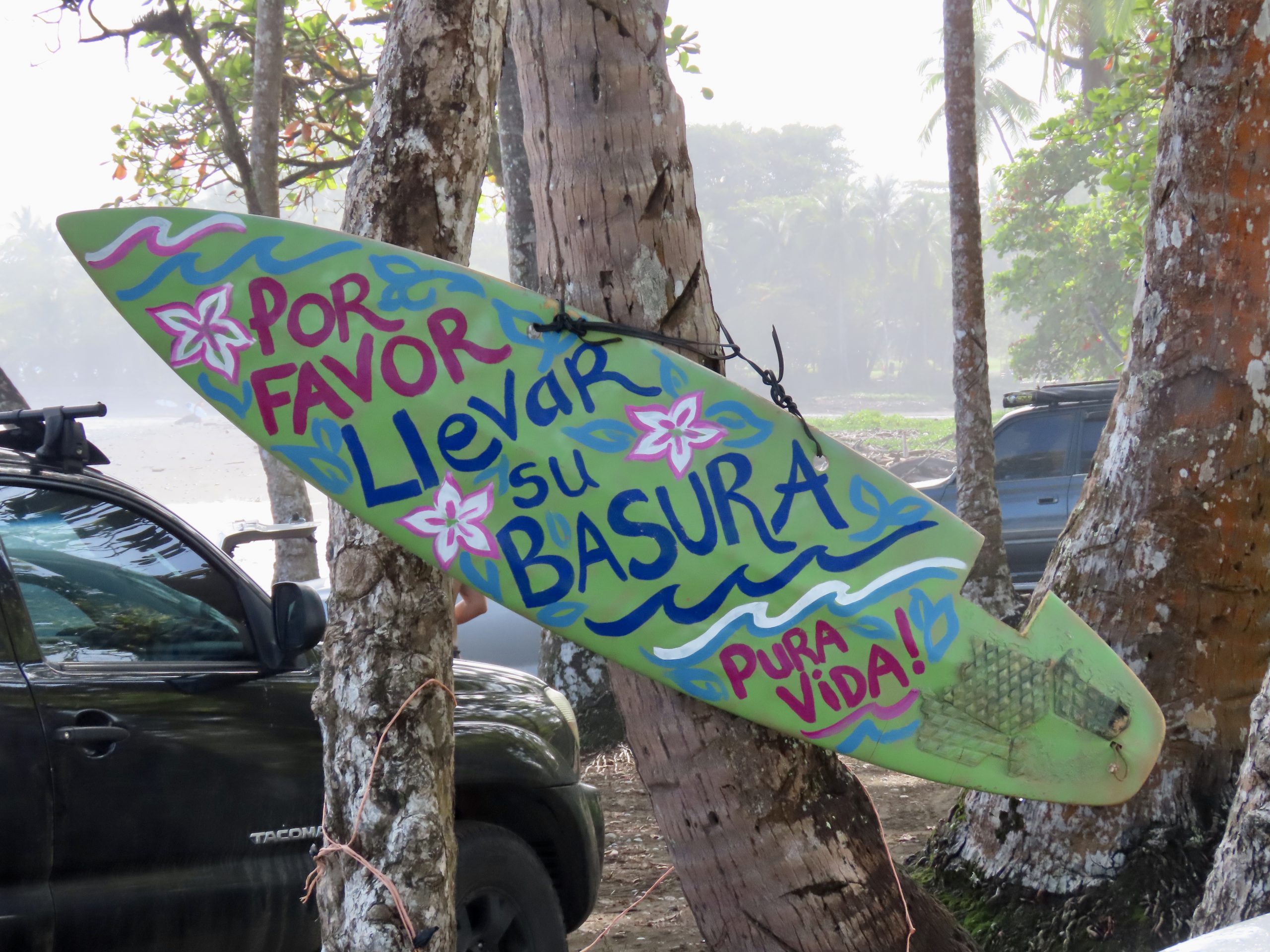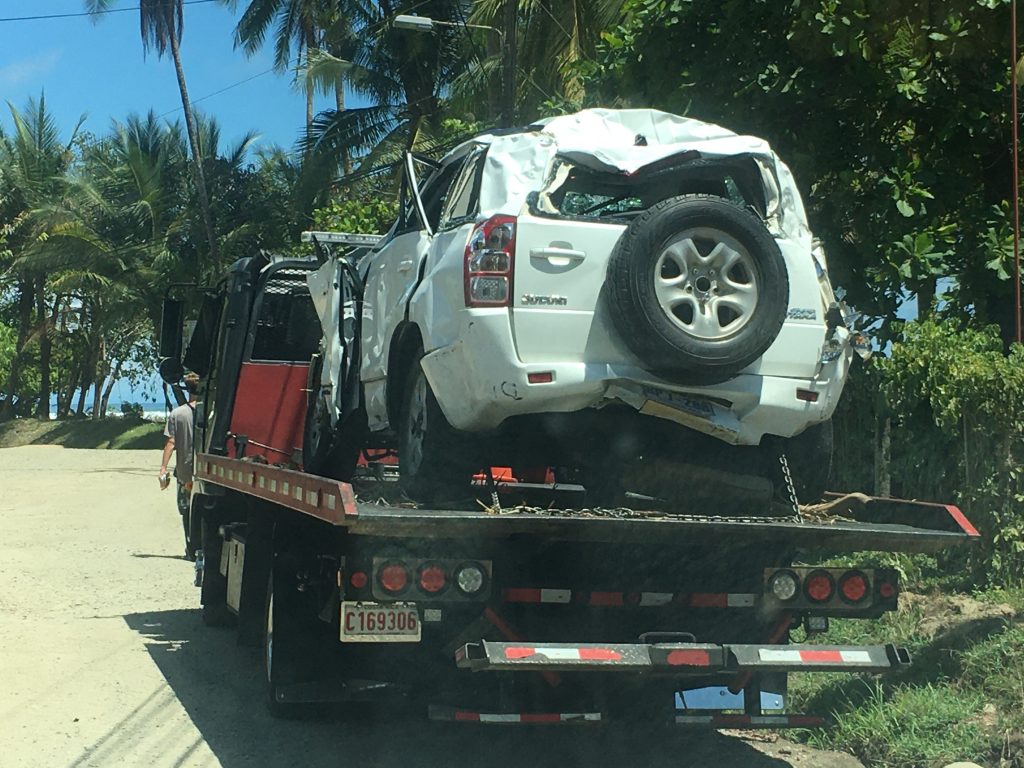
Latest Travel Update on Covid-19 in Costa Rica

5 Ways To Adopt a Sustainable Surfing Lifestyle
These tips are what to do before you rent a car, truck, or SUV in Costa Rica, when you pick up the vehicle, while driving, and what to do when returning the vehicle. (updated July 2024 – so there are more than 11 now)
Before your trip –
- When comparing rates, be sure to read the reviews of the car rental company you choose. I only work with Vamos, Adobe, and Alamo because their customer service is so good. Vamos has some of the best prices, but only has two offices and will sell out of their inventory quickly. Adobe has some of the newest vehicles, offers great low season discounts, and has a dozen offices around the country. And Alamo has offices at nearly every beach town, has low rates on newer vehicles, and great long term rental discounts. I also work with a few small local businesses to help clients who just have debit cards or want a specialty vehicle like a camper van.
- Be sure you know what to expect when paying for insurance. If you see a rate too good to be true, it probably is because it does not include the mandatory third party liability insurance. That can add $12 to $30 per day, plus the 13% tax. I wrote this article for helping determine which insurance may be best for you – LINK
- Know how you will get to your vehicle. The major car rental companies have kiosks inside of the airport, but most all of them keep their vehicles at an office offsite. They will greet you at the kiosk, call their shuttle to take you to their office, and that can take no time if the shuttle is parked or a few minutes if the shuttle is dropping off other travelers.
- Rental companies also will deliver and pick the car at most hotels (not AirBnb’s). If you choose that option, check for an extra charge, and be sure to tell the front desk that you are expecting the rental company to come.
- Be sure you have a credit card for the deposit if it is required, and a physical copy of your driver’s license and passport.
When you pick up your vehicle –
- When you get the car, READ the contract carefully before you sign in. There are many exceptions for insurance, like driving on unpaved roads or going through water. Ask what the fuel charge is since at times you may be running late for a flight and don’t want to stop to get gas. There is usually a hefty fee if you lose your keys. I did this once and was charged $450 since it was an electronic key. Luckily my travel insurance through Travel Guard covered this.
- While at the car rental desk, take a photo of your first page of your passport AND the page showing your entry stamp. That way if you are driving without your passport or lose it, then at least you have a photo to show the police. Also take a photo of your driver’s license.
- Thoroughly inspect the vehicle with the representative. Too many clients just want to leave quickly and then find problems later. The representative is to mark any scratches or dents on the vehicle on a form that you sign, and include the fuel level. I have them mark everything bigger than a pea. I check these items – emergency roadside kit (legally required), spare tire, tire tread on the tires and spare, fenders and mudguards, roof, and stains on seats or rugs. Then I start the car and check that the windows work, locks work, the a/c is cold, the stereo works, wind shield wipers and fluid pump, and I open the hood to check for any weird sounds. It also helps to know how to open the hood and find the release for the gas tank lock. If there appears to be anything bad enough to worry about later on your trip, then ask for a different vehicle – especially tire tread and malfunctioning electronics.
- Before leaving the lot I figure out the stereo system and how to connect to bluetooth if that is an option. The representative can explain it to you if you need assistance. One tip is to bring with you a phone holder for your car (either one that fits in a drink holder or attaches to the air vent). That makes it a lot easier to follow directions on Waze.
During your trip –
- When you need to get gas – every gas station in the country charges the same amount and have both regular gas and diesel. Be sure to put in the right type of fuel (many of the larger SUVs require diesel). Most gas stations are open 24 hours a day. The attendants fill the tank for you. WATCH to make sure they reset the fuel pump and double check the final total for your charges. They can make change for US dollars but the exchange rate is not that great. Some attendants are nice enough to clean the windshield and you are welcome to give them a small tip.
- If you get into an accident, be sure to wait and get a police report. This will help later if you need to pay any fines or for repairs. Your travel insurance and the rental company will ask for this. You can call 911 and ask for help (they speak English). Your rental contract will have a number to call for assistance as well. If you scratch or dent the car, take a picture of it right after it happens. That prevents a rental company from overcharging you for repairs.
- If you get a ticket for speeding (up to $560), not wearing a seatbelt ($80), parking illegally (up to $160), then do not hide it form the rental company. Call or email them and ask how to pay it. The companies I work with will pay the ticket for you and charge your card, but you have to tell them. If the police take your license plate (which they do at times for parking illegally), then inform the car rental company and ask them what to do to avoid spending too much on fines. Generally the highways are 80kph, going around turns or entering or exiting towns is 60kph, in town it’s 40mph, and near schools and hospitals it is 25kph. Try not to rush, there is a lot of natural beauty to enjoy while driving and a lot of people walking or biking along the road. And even though you see a lot of people doing it, it IS illegal to cross a double-yellow line.
- If you get pulled over and you feel that the police officer is trying to extort money from you, take out your phone and ask for the their name and badge number. You can also tell them that you need to call your lawyer or ‘abogado’. If you did not do anything illegal, then most often they will let you go.
- You should never leave luggage or any valuable items in your vehicle unattended, even if they are in a locked trunk. Thieves have even been known to block the electric signal on your keys, so be sure to check the handle to know it is locked. There are some lots with parking guards, but one person may not be able to watch everyone’s vehicles. Some travelers bring a long metal cord and a lock to run through the handles of their suitcases, but this will only add another another few seconds to the time it takes for a professional thief to cut the cord. If you do need to stop, have one person stay with the vehicle. It is suggested that when eating at a restaurant to park the vehicle where it is clearly visible to you, but even this is not 100% effective so bring with you the most valuable items (phones, computers, cameras, and passports) just in case.

When returning the vehicle –
- Give yourself about 30 minutes of time for returning the vehicle and getting the shuttle to the airport. Try to return it full of gas, but if you cannot then the fuel charge is most often not much more than the cost of the gas, and you may need that time to catch a flight. When I am running late, I will park at the airport, check in for my flight (2 hours before is recommended), and then drive the car to the rental office. If I am really late, I will call the rental office to tell them I am leaving the car in the airport parking lot and putting the keys under the driver’s seat. I have to leave it unlocked which is a risk, but the rental company will get it within a day and only charge me for the parking (~$20/day) and possibly one extra day’s rental. The companies I work with are very understanding. I also will take photos of the vehicle or a video to show that it was not damaged, just in case there is an issue.
- When returning your vehicle be sure to get them to sign off on the form saying there were no damages to the vehicle, and keep a copy of it. Also, ask them to rip up the deposit slip they printed of your credit card. Ask the rental agent for a copy of the receipt, and have him or her go over it with you so you understand everything you were charged for. The price should be the same as the quote of your confirmation.
One Bonus tip! If you are traveling with surfboards, most likely you have boardbags to get them from the airport to your hotel. After you check in and unpack them, put down the seat and ride with the boards in your SUV or car. The reason is that the police have random stops set up and if they see boards riding on the roof, they are more likely to stop your vehicle.
When you are ready to rent a vehicle, compare rates HERE or you can ask for a customized quote.
For more tips on staying safe in Costa Rica, check out our other article – 10 Ways Not to Get Your Stuff Stolen on a Surf Trip





3 Comments
Another important tip, NEVER leave anything of value in your car when you are parked at the beach. Don’t think that if it is locked it is safe.
This is a phenomenal article that covers everything you need to know about renting a car in Costa Rica. If you follow this step by step guide, you will not go wrong.
I always work with Greg on all of our rentals and he is amazing. His customer service is top notch!
Also, we always take the full insurance coverage. Many of the roads in Costa Rica are unpacked, so the full coverage buys us peace of mind. I highly recommend spending the extra money.
Fantastic information! Wish I had this much knowledge before my last trip to Costa Rica ! Also, Greg has been very helpful in helping me book a car for this upcoming trip so I look forward to meeting him and will definitely recommend him to others as well!
Thanks again Greg for you prompt responses and professionalism!